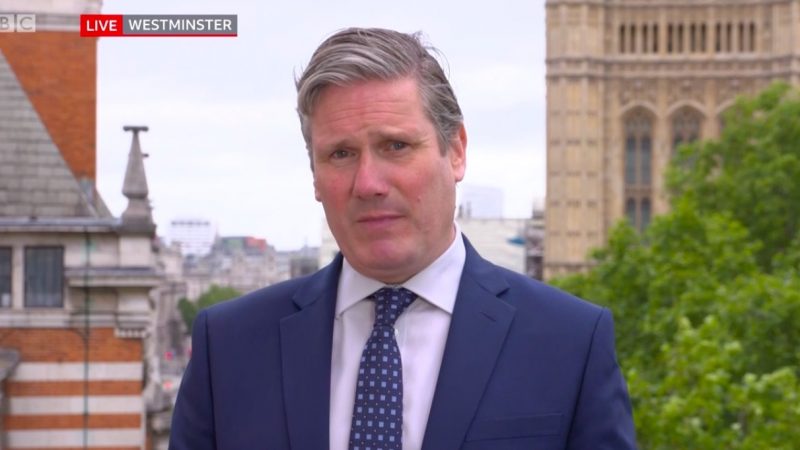
Keir Starmer has said that he regrets his use of language when he said that the Black Lives Matter movement is a “moment” during an interview with BBC News earlier this week.
The Labour leader clarified his position this afternoon during a Q&A with the press, following criticism for the remarks – he said today that this was a “defining moment” in race relations.
Asked about his comments, Starmer said: “If people have thought [I] meant something else, then of course I regret that. This is not a moment for not standing with the Black Lives Matter movement and the injustice that is being exposed.”
Starmer had initially said: “The BLM movement, or moment if you like, internationally is about… reflecting on what happened dreadfully in America just a few weeks ago, and showing or acknowledging that as a moment across the world.”
Unite assistant general secretary Howard Beckett described the comment as “appalling”, while Labour MP Flo tweeted: “[The] choice of words in the interview was wrong. I will continue to relay constituents’ views to Keir.”
The offending remarks from the Labour leader were made when discussing the protests and the demand by the organisation to ‘defund the police’, which he called “nonsense”.
Starmer argued: “That’s nonsense and nobody should be saying anything about defunding the police, and I would have no truck with that – I was the Director of Public Prosecutions for five years.
“I worked with police forces across England and Wales bringing thousands of people to court. So my support for the police is very, very strong and evidenced in the joint actions I’ve done with the police.”
Labour leader Sir Keir Starmer tells #BBCBreakfast it’s "a shame" the sentiment behind the Black Lives Matter movement is getting “tangled up with these organisational issues" and it’s "nonsense" to call to ‘Defund the Police’. pic.twitter.com/7ydITWGZWN
— BBC Breakfast (@BBCBreakfast) June 29, 2020
Following a growing backlash in the Labour movement, the Labour leader appealed to black members not to leave the Labour Party in an interview with the HuffPost today.
He said: “The Labour Party is a broad church. It is a place that I hope and am determined that black people feel that they are welcome, that they want to be. We definitely need as much black representation in the Labour Party as we can possibility get.”
The Labour leader discussed his decision to commission an independent inquiry after a report was leaked about antisemitism within the party, which also alleged examples of Afriphobia.
He said: “Amongst the reasons we took the actions that we did, was to try to show as quickly as we could to people that they could have confidence in Angela Rayner and myself to root out racism and to take swift action in order to do so without inhibitions.”
He added: “Within hours of getting the leaked report we had ordered an independent inquiry. We didn’t delay, we didn’t just leave it to the internal process, and we have not inhibited that inquiry in any way whatsoever.
“It’s been in place in a matter of a few weeks and people will judge us, I think, when those reports come in. I’m determined it’ll be independent and I’m determined we’ll act upon it when we see the results of that report.
“Meanwhile the internal processes are going on and that has led to action already – albeit, frustratingly, for a number of weeks I wasn’t able to point to that when people were criticising me because of the confidentiality of the process.”
He described how Martin Forde QC had been appointed to direct the inquiry, and instructed to “go wherever he needs to go”. The Labour leader said: “There’s no ‘no go areas’. He has not been given any instructions not to look at anything.
“He has got complete freedom to go where he needs to go, such is the determination to root out any racism in our party and deal with it – and be seen to deal with it – effectively.”




More from LabourList
Government abandons plans to delay 30 local elections in England
‘The cost of living crisis is still Britain’s defining political challenge’
‘Nurses are finally getting the recognition they deserve’